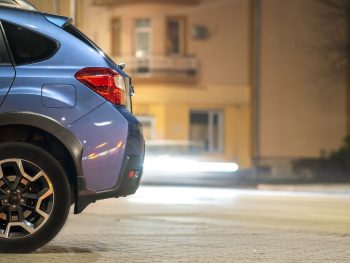Supersized SUVs should pay higher parking charges, say drivers
Drivers have lent their support to calls from campaigners for parking costs in cities to be based on the size of a car and for fairer taxes in favour of lighter and more appropriately sized cars.

The move to heavier cars may lead to a rise in fatal collisions if the trend continues
Clean Cities, a European network of organisations calling for healthy and climate-friendly transport in cities, has called for action to tackle the phenomenon known as ‘carspreading’.
It’s warning that around 4.6 million cars bigger than a typical urban car parking space have been sold in the UK since 2021 – more than 1.2 million a year, and with numbers growing.
Supersized SUVs, which are either more than 1.8m wide or 4.8m long, have been growing in popularity despite them “crowding out space in towns and cities, causing more road wear and being more likely to cause fatal injuries for children, cyclists and those driving smaller cars”.
If you were to add up just the extra length and width that overhanging SUVs take up, it would stretch for over 192 miles, the equivalent of driving from London to Leeds, according to researchers for Clean Cities.
The organisation commissioned a YouGov poll asking drivers how the money raised from additional charges on SUVs should be spent.
The most popular measures amongst car owners were to fix the millions of potholes (54%) on Britain’s roads, which increase danger and repair costs for motorists and cyclists; followed by safer roads (40%) and better public transport (36%). Only 19% said there should be no additional measures for SUVs.
According to the YouGov polling, 61% of UK passenger car owners agree that “SUVs take up too much space”, while only 19% disagree. Seven in 10 (71%) of car owners also agree that SUVs make parking more difficult, while only 15% disagree.
Oliver Lord, UK head of Clean Cities, said: “Cars are getting bigger every year – while our streets are not. We need carmakers to prioritise normal-sized cars that can be parked more easily and are less dangerous to people walking around. It’s only fair if you want to buy a massive SUV that you should expect to pay more for the space it takes up.”
The proposals are included in new academic study which finds that the move to heavier cars may lead to a rise in fatal collisions if the trend continues.
According to ‘the fourth power law’’, a formula developed by US Highway Officials, the damage done by a vehicle to a road surface is proportional to the fourth power of its axle weight.
A two-tonne SUV therefore does 16 times more damage than a one-tonne car. The potholing of road surfaces is even worse when it rains because heavier vehicles create much stronger hydraulic pressure, forcing water into any flaws and breaking up the road surface.
Reducing car weight could mitigate the severity and frequency of collisions, while the academics suggest that policy makers could consider “taxation on heavier cars” and that “local authorities could adjust parking policies to charge higher fees for heavier cars”.
New taxes could also reap significant rewards for HM Treasury and the Department of Transport. And as well as the additional revenue, discouraging sales of heavier cars could reduce road maintenance costs.
The study, led by civil engineer Ruth Carlson with a co-author from the University of Huddersfield, is based on preliminary findings with the full paper out later this year.
















Leave a comment